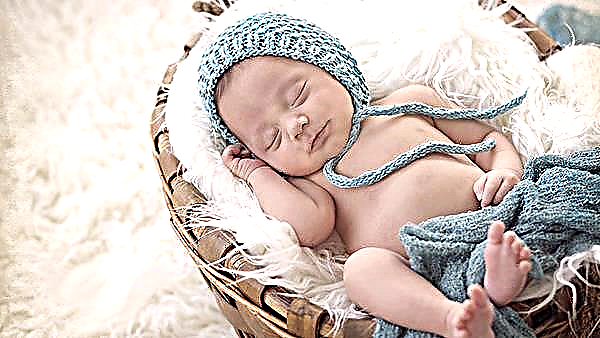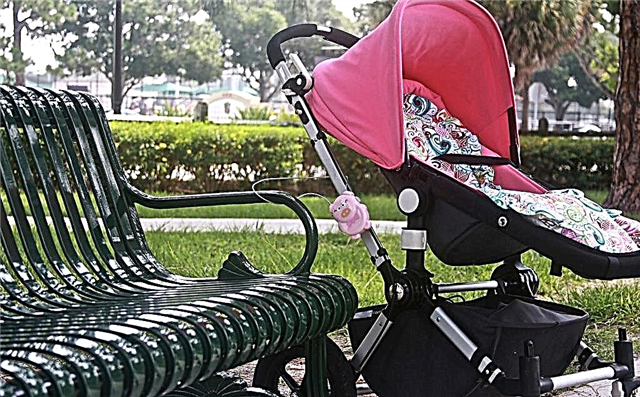
The question of restoring the menstrual cycle after childbirth is always quite complex and controversial. Especially a lot of questions arise in women who gave birth by caesarean section. The discharge takes a long time, it is not always clear whether the period has already begun or not and when to expect it. In this article, we will talk about the features of the restoration of the menstrual cycle after a cesarean section.

Recovery time
During pregnancy, a woman's body produces large amounts of the hormone progesterone, which helps her to bear the baby. After childbirth, progesterone is reduced to a minimum, other hormones - oxytocin and prolactin - come to the fore. The first helps the uterus to involve to its previous size, shrink, the second helps to develop lactation for feeding the baby.
The onset of menstruation is a 90% hormonal process, and only to a small extent it is curled from the restoration of tissues and cells of the uterus, its epithelium. As soon as the hormonal background returns to normal, the ovaries begin to work, which were suppressed by hormones during pregnancy and the maturation of new eggs did not occur, menstruation will definitely begin.

No doctor will be able to tell you the exact time of the onset of menstruation, since the process of hormonal regulation and the individual characteristics of one postpartum woman are completely different from the analogous criteria for another.
Most often, in women who do not breastfeed for some reason and their babies are artificially fed, prolactin does not have a large effect on the body, and therefore their menstruation is more predictable. They come when the uterine cavity is cleared of lochia and hormones begin to be released according to the usual scheme: follicle-stimulating - luteal - progesterone - estrogen. Most often, the first menstruation in the absence of breastfeeding begins 2-3 months after surgery.
With nursing mothers, everything is not so simple, and we will talk about this in more detail below.

Discharge after surgery - what is it?
What many women mistakenly call menstruation after childbirth, in the language of doctors is called "lochia". They stand out from the time of delivery within 6-8 weeks, regardless of the type of delivery - natural or surgical. After a cesarean section, however, the lochia usually stands out for a little longer.
Menstrual blood is epithelial cells that have grown in anticipation of implantation of the embryo, but in its absence, are rejected by the body. In the monthly fluid there are many enzymes, special substances, cervical mucus, intrauterine fluid. Lochia is blood that is secreted from a placental wound. After the separation of the placenta, which has grown together with the uterus by blood vessels, the wound is inevitable, and unlike incisions, it cannot be sutured.

Blood clots in lochia are a sign of the beginning of the process of blood coagulation on the wound surface. After 5-6 days, an ichor appears in the secretions after the operation, after a week - mucus. Typically, two months after the caesarean section, the discharge is normal.
With the end of the withdrawal, the lochia uterus shrinks to its usual size and weighs about 50-70 grams. Its cavity is cleared. Theoretically, she is ready to conceive again, but this readiness is announced by the arrival of regular menstruation. It is clear that in no case is it necessary to get pregnant right away, because the process of repairing a scar on the uterus is longer and very important for bearing the next baby. This is just a fact that nature intended, and nothing more.

Differences from regular menstruation
It is impossible to confuse lochia and regular menstruation. There is always a sufficiently long time gap between them. If the post-spinal discharge is over, and after a couple of days they started with renewed vigor, then this is not menstruation, but a possible postoperative complication, infection, inflammation, impaired uterine contractility, problems with scar healing.
Menstruation is by and large spontaneous. The cycle will no longer be the same as before pregnancy, the day of your period will change. Discharge in the first menstrual period may be more scarce than it was before pregnancy. This is due to the physiological depletion of the inner functional layer of the uterus - the endometrium. The first menstruation may last a couple of days less for the same reason. But already a month after it, with repeated menstruation, the cycle will begin to gradually level out and return to the usual parameters of a woman's duration, frequency, abundance of discharge and the presence or absence of premenstrual syndrome.

What influences?
In addition to hormonal and rehabilitative factors that affect the restoration of the menstrual cycle, other circumstances also affect the timing of the onset of menstruation.
- The psychological state of the postpartum woman. In a woman in a depressed state, in a state of postpartum depression, the cycle is restored much longer.
- Age. In young girls, the menstrual cycle after cesarean section is restored several times faster than in women who gave birth after 35 years.
- Lifestyle. Chronic lack of sleep, malnutrition and vitamin deficiency in the body, anemia, smoking and alcohol intake can significantly delay the recovery of the female cycle.
- Taking medications. If a woman, for various reasons, after the operation was treated for a long time with antibiotics, hormonal drugs, took anticonvulsants, you should not count on the early arrival of menstruation.


In lactating women, menstruation begins later than in those who do not breastfeed. The point is in the hormone prolactin, which is produced during lactation and is part of breast milk. And in this, women who gave birth themselves, and those who underwent a delivery operation, are no different. Prolactin has a pronounced inhibitory effect on the production of progesterone, and without this hormone, the ovaries cannot function fully. Thus, the maturation and release of the egg from the follicle does not occur, there is no menstruation.
The more often the child sucks, the more often the mother feeds the baby on demand, the more prolactin is produced and the longer the restoration of the menstrual cycle can be postponed.
At about six months, the mother, on the advice of the pediatrician, begins to add complementary foods to the baby. Less breast milk is consumed, which leads to a decrease in its production and a decrease in prolactin. Progesterone begins to gradually recover in its rights, and about a couple of months after the start of complementary foods, menstruation begins (the timing is rather arbitrary).

Women who have babies from birth on mixed feeding (breast milk + adapted milk formula), menstruation begins earlier - up to six months after the operation. Those who are against complementary feeding and for up to a year prefer to breastfeed the child only, may not see menstruation for more than a year.
When should you see a doctor?
The reason for contacting a doctor and searching for the causes of irregularities may be the absence of menstruation for six months if a woman does not breastfeed, or for a year if she breastfeeds and uses complementary foods for baby food.

The first 2-3 cycles after the onset of menstruation may be somewhat irregular. But if within six months from the first menstruation the cycle has not become regular, be sure to consult a doctor.
You need to go to the doctor even if your period after cesarean is very painful, it is difficult, with fever, worsening of health, severe pain in the lower back and lower abdomen. Unusual discharge should also alert you - menstrual flow with foam, a strong unpleasant odor, the presence of large blood clots - all this needs examination and treatment.

About contraception
Lack of menstruation after a caesarean section during breastfeeding is not a method of contraception. The fact is that a woman cannot feel or notice the moment at which progesterone will again begin to be produced due to a slight fluctuation in the level of prolactin. And it is at this moment that the maturation of the first egg after childbirth can begin. Lack of contraception at this point can lead to an unplanned pregnancy.
Women after a cesarean section are advised to refrain from such situations at least 2 years. This is important for the complete formation of a scar on the uterus, for the restoration of the entire body as a whole. Even abortions during these two years will have an extremely negative effect on the condition of the internal scar, and therefore it may be inconsistent and heterogeneous.

With such a scar, it will then be more difficult to become pregnant, it is more difficult to bear the child, since the likelihood of miscarriage, low abnormal attachment of the placenta, fetoplacental insufficiency and fetal growth retardation increases. A thin and inconsistent scar will not allow a woman to give birth to a second baby on her own after the first cesarean section, she will have to do a second operation. He may not stand it and disperse while carrying crumbs, and this is fraught with death for both the fetus and the mother.
Sexual relations in the first two months after surgery are contraindicated, since they create a risk of mechanical injury to the scar, and also increase the likelihood of infection from the outside into the genital tract and the uterine cavity. After the lochia stops, you need to use a condom for intimate contacts. Barrier contraception is extremely important until your menstrual cycle is fully restored and regular.

After that, a woman should visit a gynecologist and discuss with him other methods of contraception if, for some reason, partners are not too happy with condoms. Planning your next pregnancy should be approached with the utmost responsibility.
How to help restore the cycle?
In the postoperative period, a woman should follow all the doctor's recommendations. Do not lift weights, do not make sudden jumps, falls. You should not use tampons, for the rehabilitation period it is better to use sanitary pads.
It is important to eat well throughout the recovery period. A woman needs a sufficient amount of protein foods and vitamins to restore the cycle. Therefore, diets, gym visits and other "delights" to bring yourself, your beloved, in shape after childbirth, it is better to postpone until the onset of the first menstruation or for six months after surgical delivery.

For information on when menstruation begins after a cesarean section, see the next video.



